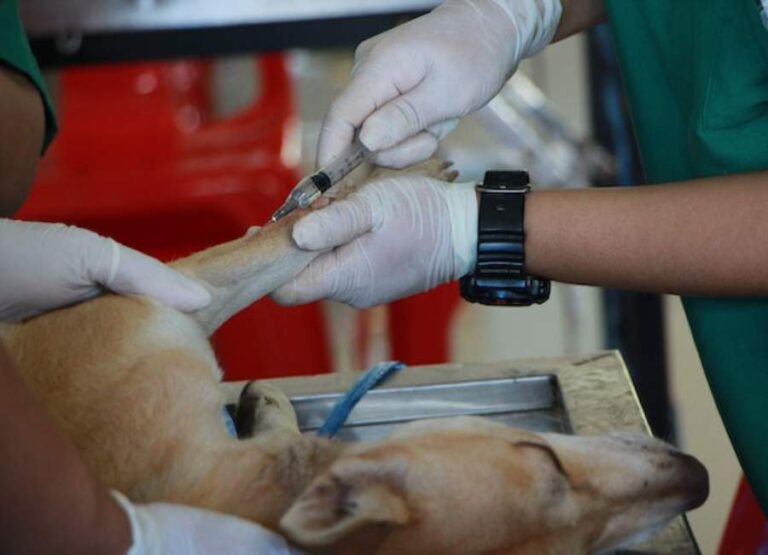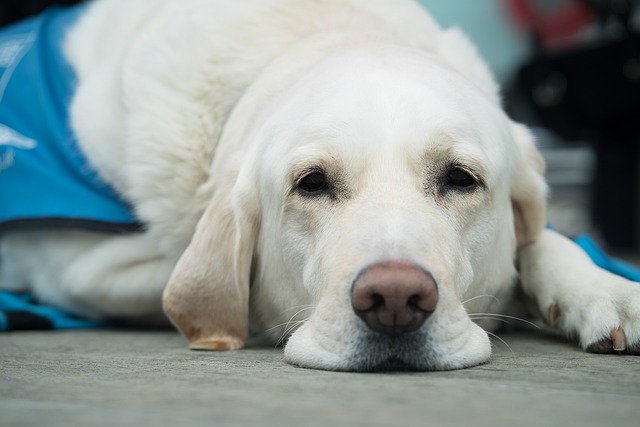Understanding Beagle Diarrhea And Vomiting

Let’s discuss beagle diarrhea and vomiting together…
Are you dealing with a Beagle who’s suffering from diarrhea and vomiting? Trust me, there’s hardly anything more distressing than a sick pup.
But don’t worry, we’ve got you covered. In this blog post, we’ll guide you through all the possible causes of Beagle diarrhea and vomiting and how to help your furry friend feel better.
So without any further delay, let’s dive in!
Causes of Beagle Diarrhea And Vomiting
The following are some of the most common causes of beagle diarrhea and vomiting and how to handle each:
1. Dietary Indiscretions
Beagles have a voracious appetite and an uncanny ability to discover and consume things they shouldn’t.
Scavenging table crumbs, raiding the trash can, or consuming something unexpected while walking are all common dietary transgressions.
These actions might cause gastrointestinal distress, resulting in diarrhea and vomiting.
Hints
To deal with dietary mistakes in beagles, it is necessary to withhold food for 12 to 24 hours to enable their digestive system to settle.
However, make sure they have plenty of fresh water to drink to keep them hydrated.
Following the fast, gradually reintroduce a bland meal of boiled chicken and rice or a prescription diet advised by your veterinarian.
Keep an eye on your Beagle, and if symptoms persist or worsen, visit a veterinarian for additional assessment and advice.
2. Intestinal Parasites
Worms (such as roundworms or hookworms) and protozoa (such as Giardia) are sadly frequent in dogs, especially beagles.
These unwanted guests may wreak havoc on your Beagle’s digestive system, causing diarrhea and vomiting.
Hints
A stool sample analysis by your veterinarian is critical for parasite diagnosis and treatment.
If parasites are present, your veterinarian will prescribe suitable deworming drugs or anti-parasitic therapies.
To reduce the danger of reinfestation, it’s also critical to maintain a regular deworming regimen and provide monthly parasite preventives suggested by your veterinarian.
Infections, both bacterial and viral, can cause gastrointestinal problems in Beagles.
Infections caused by parvovirus, salmonella, or E. coli are common causes.
Hints
Seek quick veterinarian assistance if you suspect an infection.
To determine the causal factor, your veterinarian will undertake diagnostic procedures such as blood testing or fecal examinations.
Treatment may include supportive treatment, such as intravenous fluids and symptom-controlling medicines.
Isolation may be required in some circumstances to avoid the spread of contagious illnesses.
4. Food Intolerance or Allergies
Like people, beagles can acquire dietary intolerances or allergies. These sensitivities might result in digestive issues such as diarrhea and vomiting.
Certain proteins (e.g., beef, chicken), cereals (e.g., wheat, maize), dairy products, or chemical additives included in commercial dog food are common causes.
Hints
If you believe your pet has a food intolerance or allergy, visit your veterinarian immediately for thorough testing and diagnosis.
To determine the individual allergies, your veterinarian may prescribe an elimination diet or blood testing.
Once determined, your veterinarian will help you choose a hypoallergenic or limited-ingredient food for your Beagle.
Feed your Beagle no table scraps or meals containing allergic components. Stick to high-quality dog food that meets their individual requirements.
5. Gastrointestinal Disorders
Beagles are susceptible to gastrointestinal problems such as inflammatory bowel disease (IBD), pancreatitis, and gastritis.
Chronic beagle diarrhea and vomiting can result from several gastrointestinal illnesses.
Hints
Diagnosis and treatment of gastrointestinal problems require the assistance of a veterinarian.
To discover the underlying illness, your veterinarian may do diagnostic procedures like as blood testing, fecal examinations, or imaging.
Treatment options may include anti-inflammatory medication, dietary changes, or specialized veterinary diets suited to the individual disease.
6. Swallowed Objects
Beagles have a habit of ingesting things they shouldn’t, such as socks, toys, or even rocks.
These foreign bodies can induce intestinal obstructions, which can result in severe symptoms such as diarrhea and vomiting.
Hints
If your Beagle has ingested a foreign item, seek immediate veterinarian attention.
To analyze the issue, your veterinarian may offer diagnostic imaging, like X-rays or ultrasounds.
Surgery may be required in some circumstances to remove the obstructing object and avoid additional difficulties.
7. Medication Side Effects
Certain medications, particularly antibiotics and nonsteroidal anti-inflammatory drugs (NSAIDs), might irritate the stomach lining of your Beagle, resulting in diarrhea or vomiting.
Hints
Consult your veterinarian if you feel medicine is to blame.
To reduce the negative effects, they may alter the dose, switch to a different medicine, or offer further therapies.
Never stop or change a medication without consulting a veterinarian.
8. Pancreatic Issues
Pancreatitis, or pancreatic inflammation, can develop in beagles and cause vomiting and diarrhea.
Hints
High-fat meals are frequently a cause of pancreatitis. Seek veterinarian assistance if your beagle’s symptoms persist or worsen.
To lower the chance of recurrence, treatment may include medication, a low-fat diet, and lifestyle changes.
Regular monitoring and adherence to an appropriate diet can aid in the efficient management of this illness.
9. Poisoning
The inquisitive nature of beagles can occasionally lead to disastrous contact with harmful substances.
Cleaning materials, human drugs, and some plants are all potentially harmful to their health.
Hints
Contact a veterinarian or a pet poison hotline right once if you suspect poisoning.
A favorable outcome requires quick action. Without expert supervision, do not attempt to induce vomiting or provide any home treatments.
10. Excessive stress or anxiety
Stress and worry can have a significant influence on the digestive tract of beagles.
Major life upheavals, separation anxiety, or even loud noises might cause stomach trouble.
Hints
Make your Beagle’s habitat peaceful and safe. Activities like as frequent exercise, interactive toys, and puzzle feeders may provide lots of mental and physical stimulation.
Make sure they have a relaxing and getaway area. Consider employing stress-relieving products such as pheromone diffusers or soothing supplements.
In severe circumstances, get advice from a professional dog behaviorist on how to manage your Beagle’s nervousness.
Learn more about identifying a sick beagle.
Signs and symptoms of Beagle Diarrhea And Vomiting
Some common signs and symptoms of Beagle diarrhea and vomiting include:
- Vomiting up yellow stomach bile with or without foam and mucus
- Diarrhea and gas
- Stomach upset or infections caused by viruses or inappropriate food
- Blood in stool or vomit
- Weight loss
- Weakness
- Lack of appetite
- Dehydration
- Lethargy
- Abdominal pain
If your Beagle is experiencing any of these symptoms, it may be wise to take them to the vet for an evaluation to determine the underlying cause and appropriate treatment.
Learn more about the most common health problems in beagles.
Home Care for Beagle Diarrhea and Vomiting
If your Beagle is experiencing diarrhea and vomiting, there are several home care remedies that can help manage their symptoms.
Firstly, it’s important to ensure that your Beagle is not eating anything that may be causing their distress, such as spoiled food or food they’re allergic to.
Additionally, make sure they have access to plenty of fresh water to avoid dehydration.
You should also fast your Beagle for 12–24 hours to give the beagle’s digestive system a chance to rest.
After fasting, slowly introduce a bland diet consisting of boiled rice and skinless, boneless chicken or boiled hamburger meat.
You can gradually reintroduce their regular diet once their symptoms have subsided.
There are also several over-the-counter probiotics and digestive enzymes that may help with your Beagle’s symptoms.
However, it’s always best to consult with your veterinarian before administering any medications or supplements.
If your Beagle’s symptoms persist or worsen, it’s important to take them to the vet for a proper diagnosis and treatment.
Chronic or severe diarrhea and vomiting can be indicative of underlying medical issues, such as pancreatitis or inflammatory bowel disease.
Learn more about why your beagle is shaking.
Veterinary Diagnosis and Treatment of Beagle Diarrhea And Vomiting
Beagle diarrhea and vomiting can be caused by various factors, including infections, dietary indiscretion, and underlying medical conditions.
To diagnose the underlying cause, a veterinarian may perform a physical exam, collect a fecal sample for analysis, and run blood tests.
Treatment options may include medication to address the underlying cause, dietary changes, and fluid therapy to address dehydration.
It is important to seek veterinary care if your Beagle is experiencing continuous vomiting or diarrhea, as these symptoms can quickly lead to dehydration and other complications.
Learn more about a dog not eating but throwing up.
Preventing Beagle Diarrhea and Vomiting
Beagle diarrhea and vomiting can be caused by a variety of factors, including eating inappropriate foods, parasites, infections, motion sickness, and more.
To prevent these issues, here are some ways you can help keep your beagle healthy and happy:
- Pay attention to what your beagle eats and avoid giving them foods that may upset their stomachs.
- Ensure that your beagle has access to clean water at all times to prevent dehydration.
- Make sure your beagle is up to date on all necessary vaccinations and parasite preventatives.
- Avoid feeding your beagle table scraps or food that is high in fat, salt, and preservatives.
- Supervise your beagle when they are outside and prevent them from eating grass or other potentially harmful plants.
- Do not feed your beagle immediately before or after traveling to prevent motion sickness.
- Keep your beagle’s living environment clean and free from potentially harmful bacteria or parasites.
- Consider using probiotics or other supplements to promote a healthy digestive system.
- Consult with your veterinarian if your beagle experiences persistent diarrhea or vomiting, as it may be a sign of an underlying issue that requires medical attention.
Frequently Asked Questions
What could be the cause of my Beagle’s sudden diarrhea and vomiting?
Diarrhea and vomiting in dogs, including Beagles, can be caused by a number of things such as dietary changes, infections, parasites, or even stress. It’s best to consult with your veterinarian to determine the exact cause and to get proper treatment.
Should I be worried if my Beagle is experiencing diarrhea and vomiting?
Yes, it’s always important to monitor your dog’s health closely and seek veterinary care if you notice any changes in their behavior or health. Diarrhea and vomiting can lead to dehydration and other health complications, so it’s best to have them checked out by a veterinarian.
What should I feed my Beagle if they have diarrhea and vomiting?
Your veterinarian may recommend a special diet or even fasting for a short period of time to help your Beagle recover. It’s important to follow their recommendations and not to give your dog human food or treats during this time.
Can I give my Beagle medication for their diarrhea and vomiting?
It’s not recommended to give your dog over-the-counter medications without consulting with your veterinarian first. Certain medications can be harmful to your Beagle and can even worsen their condition.
Can diarrhea and vomiting be prevented in Beagles?
While it’s not always possible to prevent these conditions, there are some preventative measures you can take such as feeding your Beagle a consistent diet, providing them with clean water, and keeping them up-to-date on their vaccinations and parasite prevention medication.
When should I take my Beagle to see a veterinarian for diarrhea and vomiting?
If your Beagle’s diarrhea and vomiting persist for more than 24 hours, or if you notice any other concerning symptoms such as lethargy, blood in their stool, or difficulty breathing, it’s important to seek veterinary care right away.
Conclusion
As a pet owner, it’s important to keep a watchful eye on your furry friend’s health.
Diarrhea and vomiting may be common in beagles, but it’s always best to consult with a veterinarian to ensure that your pup is receiving proper treatment and care.
Remember, prevention is key – maintaining a healthy diet and regular exercise can help keep your beagle happy and healthy for years to come.

![Dog Paw Infections [Causes, Signs & More] Dog Paw Infections](https://petcreeks.com/wp-content/uploads/2023/09/natalie-parham-1dQuP79kLfg-unsplash-1.jpg)




